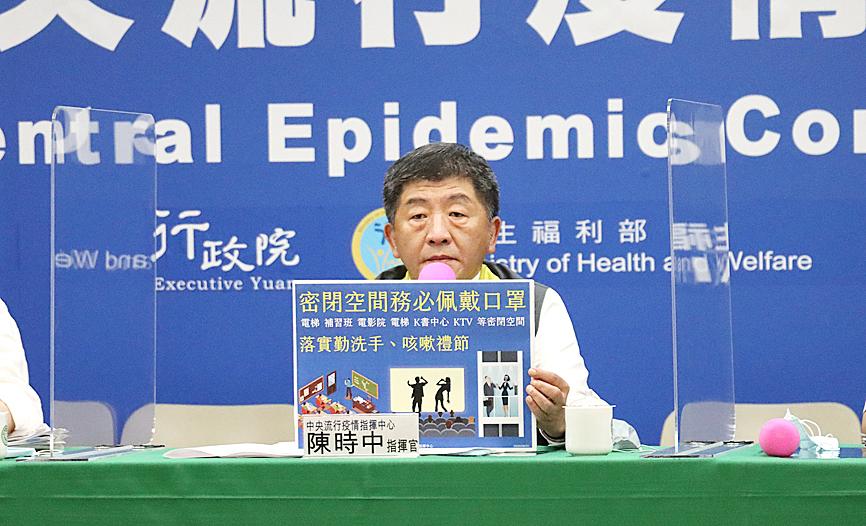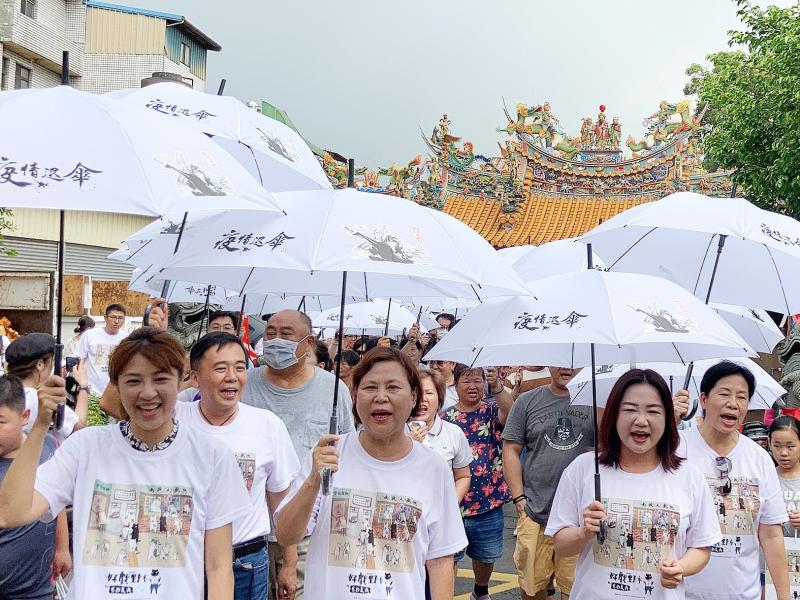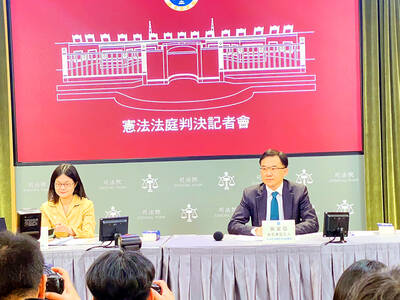The government is considering tightening mask-wearing rules again in light of a potential domestic COVID-19 infection, Minister of Health and Welfare Chen Shih-chung (陳時中) said yesterday.
The Central Epidemic Command Center (CECC) confirmed seven new COVID-19 cases, six of which are imported.
The other case involves a Belgian engineer who entered Taiwan on May 3 and remained in quarantine until May 17, said Chen, who heads the CECC.

Photo courtesy of the Central Epidemic Command Center via CNA
Although the source of infection has yet to be identified, the case could end the nation’s record of not having any domestic cases in the previous 110 days.
The Belgian, in his 20s, is a technician working on an offshore wind project in Changhua County.
He underwent COVID-19 testing to be able to return to his native country, Chen said.

Photo: Liu Pin-chuan, Taipei Times
The man tested positive in two polymerase chain reaction (PCR) tests, with cycle threshold values of 34 and 33, which Chen described as a “weak positive,” but still in the positive range for a disease considered to have an incubation period of two to 14 days.
The man was also tested for antibodies, Chen said, adding that his IgM — the first antibody the body makes when it fights a new infection — was negative, while IgG was “strongly positive.”
According to a US Federal Drug Administration fact sheet dated June 12, IgG antibodies generally start appearing about seven to 10 days after infection and often indicate a past infection.
Chen said the case has not yet been classified as an imported or domestic case, because if the man’s IgM is negative and IgG is positive, he might have been infected a long time ago.
The Belgian has been put in an isolation ward in a hospital and 89 people who had come into close contact with him are being monitored, Chen said, adding that 82 of them are under home quarantine, while the other seven are required to monitor their own health.
The Belgian had followed the rules and wore a mask on public transport, but had often gone outdoors, where he sometimes took his mask off, Chen said.
Since his movements are clear, the CECC does not plan to make them public, he said.
Five of the imported cases, men aged between 20 and 80, are from the Philippines, while the other is from Guatemala, Chen said.
They entered the nation from July 15 to Thursday and started to exhibit symptoms from July 10 to Friday, he said.
The new cases raised the nation’s total number of confirmed cases to 474 — 382 imported and 55 domestic cases, as well as 36 cases from the navy’s “Friendship Flotilla” and one case that needs further investigation.
With the pandemic raging overseas, Chen reminded Taiwanese to keep their guard up and always wear a mask when they are indoors — for example in theaters, karaoke bars, elevators and study centers.
He also urged people to wash their hands frequently and practice social distancing.
The government would maintain strict border controls, he said, adding that the nation is still safe from the risk of community outbreaks.
“If 80 percent of people often wear masks, the nation would be very safe. If only 70 percent of people did, there could be a problem, but right now the rate is under 30 percent,” he said, reiterating the importance of wearing masks indoors.

The US government has signed defense cooperation agreements with Japan and the Philippines to boost the deterrence capabilities of countries in the first island chain, a report by the National Security Bureau (NSB) showed. The main countries on the first island chain include the two nations and Taiwan. The bureau is to present the report at a meeting of the legislature’s Foreign Affairs and National Defense Committee tomorrow. The US military has deployed Typhon missile systems to Japan’s Yamaguchi Prefecture and Zambales province in the Philippines during their joint military exercises. It has also installed NMESIS anti-ship systems in Japan’s Okinawa

TRAGEDY STRIKES TAIPEI: The suspect died after falling off a building after he threw smoke grenades into Taipei Main Station and went on a killing spree in Zhongshan A 27-year-old suspect allegedly threw smoke grenades in Taipei Main Station and then proceeded to Zhongshan MRT Station in a random killing spree that resulted in the death of the suspect and two other civilians, and seven injured, including one in critical condition, as of press time last night. The suspect, identified as a man surnamed Chang Wen (張文), allegedly began the attack at Taipei Main Station, the Taipei Fire Department said, adding that it received a report at 5:24pm that smoke grenades had been thrown in the station. One man in his 50s was rushed to hospital after a cardiac arrest

ON ALERT: Taiwan’s partners would issue warnings if China attempted to use Interpol to target Taiwanese, and the global body has mechanisms to prevent it, an official said China has stationed two to four people specializing in Taiwan affairs at its embassies in several democratic countries to monitor and harass Taiwanese, actions that the host nations would not tolerate, National Security Bureau (NSB) Director-General Tsai Ming-yen (蔡明彥) said yesterday. Tsai made the comments at a meeting of the legislature’s Foreign Affairs and National Defense Committee, which asked him and Minister of National Defense Wellington Koo (顧立雄) to report on potential conflicts in the Taiwan Strait and military preparedness. Democratic Progressive Party (DPP) Legislator Michelle Lin (林楚茵) expressed concern that Beijing has posted personnel from China’s Taiwan Affairs Office to its

‘ILLEGAL RULING’: The KMT and the TPP slammed the Constitutional Court judgement, saying it contravened the law and was trying to clear the way for a ‘green dictatorship’ The Constitutional Court yesterday ruled that amendments to the Constitutional Court Procedure Act (憲法訴訟法) passed by the Legislative Yuan last year are unconstitutional, as they contravene due legislative process and separation of powers. The Legislative Yuan on Dec. 20 last year passed amendments stipulating that no fewer than 10 grand justices must take part in deliberations of the Constitutional Court, and at least nine grand justices must agree to declare a law unconstitutional. The Executive Yuan on Jan. 2 requested that lawmakers reconsider the bill, but the Legislative Yuan, under a combined majority of Chinese Nationalist Party (KMT) and Taiwan People’s Party